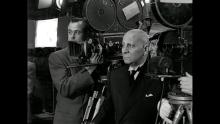
This course will provide an introduction to classical Hollywood cinema through the work of several key filmmakers, beginning with the golden age of the studio system in the 1930s and 1940s and extending up to the New Hollywood of the 1960s. We will consider the role of directors in a mature studio system marked by an industrialized and collaborative approach to filmmaking. At once ruthlessly efficient and innovative, both liberating and stifling, the studios were responsible for some of the most ambitious and influential works of American culture in the twentieth century. Over the next ten weeks, we’ll examine both the triumphs and the failures of that system. Directors will include Frank Capra, Charlie Chaplin, John Ford, Howard Hawks, Alfred Hitchcock, Ida Lupino, Nicholas Ray, Douglas Sirk, Orson Welles, Billy Wilder, and others. In addition to the lives and work of those directors, the reading and lectures will address topics such as the economic structure of the American film industry, the history and industrial strategy of Hollywood studios, the major genres, the Production Code and censorship, the introduction of new technology into the production process, the role of stars in the film industry and film criticism, styles of acting, the art of lighting and cinematography, art direction and production design, women filmmakers in the studio era, the position of African-Americans inside and outside the Hollywood system, and the decline of the studio era.
After successfully completing the course, students should be able to
identify crucial films, figures, and events in the history of American cinema;
situate classical Hollywood directors and films within their historical context;
understand the collaborative nature of the Hollywood studio system and the role of directors and other key players within it;
understand the economic structure of the American film industry in the studio era;
identify and analyze major Hollywood genres;
recognize the filmmakers operating on the margins of or well outside the Hollywood mainstream;
understand and apply various methodological approaches to the writing of film history and biography;
communicate a critical analysis of the films and approaches to film studies in discussion and in writing.